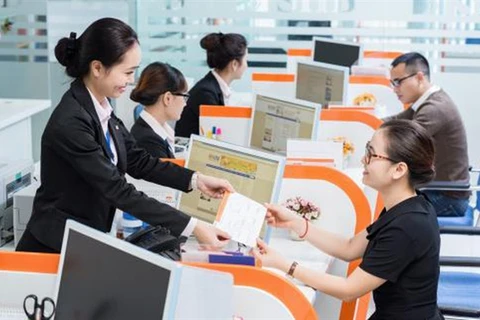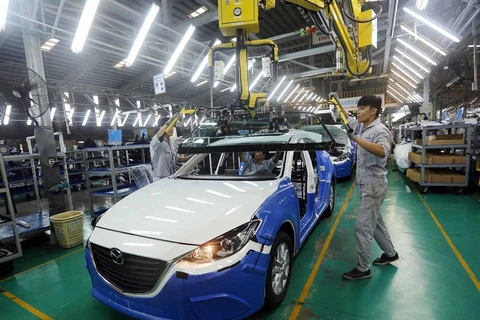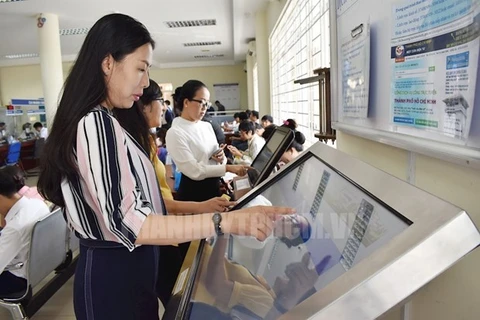Hanoi (VNA) — The interest expense deduction limit may be raised from the current 20 percent to 30 percent to support businesses, according to a draft decree on tax management for enterprises with related party transactions the Ministry of Finance recently made public for comments.
The draft would replace Decree 20/2017/ND/CP.
The finance ministry said the Decree 20 had contributed significantly to the fight against transfer pricing in the past three years but the 20 percent limit to the deductibility of interest expenses caused a lot of difficulties for enterprises.
The regulation meant the deductibility of interest payments was limited to 20 percent of the company’s earnings before interest, taxes, depreciation, and amortisation with the excess carried forward indefinitely.
The ratio of 20 percent was within the corridor of 10 percent to 30 percent recommended by the Organisation for Economic Cooperation and Development (OECD).
However, the cap of 20 percent was not appropriate to Vietnam where most firms were thinly-capitalised with the level of debt much greater than equity capital, according to the finance ministry.
Increasing the cap to 30 percent aimed to help enterprises have more capital for investment and to promote the transition of capital raising structure for operation, the ministry said.
The ministry said the application on international standards must be appropriate to the situation in Vietnam, adding that domestic enterprises needed time to narrow the development gap with the OECD’s member countries.
The draft also includes regulations about conditions for deducibility of related party transactions to prevent transfer pricing, the ministry said.
Dinh Mai Hanh, the tax partner of Delotte Vietnam, was quoted by Dau Tu (Investment) online newspaper as saying that the 20 percent ratio limit aimed to prevent the thin capitalisation strategy to avoid tax.
However, the regulation caused a lot of difficulties to domestic firms, especially those in the parent-company model or those in sectors requiring huge capital like real estate.
Nguyen Duc Nghia, President of HCM City Tax Agent Club, said the ratio cap of 20 percent or 30 percent would not be important. How to accurately identify subjects to the regulation was more important, he said, adding that most Vietnamese firms were thinly-capitalised and must seek loans for operation and most (around 97 percent) were small or medium-sized enterprises.
Deputy Director of the General Department of Taxation Dang Ngoc Minh said among nearly 4,000 enterprises with related party transactions and interest expenses, about 700 had the ratio of interest expense on EBITDA higher than 20 percent (more than 450 were foreign-invested).
The deducted interest expense was estimated at about 18 trillion VND (775.8 million USD) each year, 10 trillion VND was for domestic companies.
Domestic firms which had the ratio of interest expense higher than 20 percent were mainly operating in manufacturing and processing, real estate, construction and power production and distribution.
In 2018, the tax watchdog inspected 593 enterprises with related party transactions which helped collect 1.6 trillion VND in tax arrears and fines, cut losses by 4.8 trillion VND and increase taxable incomes by nearly 7.2 trillion VND.
In 2019, 579 companies were inspected to collect 1.16 trillion VND in arrears and fines, reduce losses by 5.8 trillion VND and increase taxable incomes by 5.9 trillion VND./.
The draft would replace Decree 20/2017/ND/CP.
The finance ministry said the Decree 20 had contributed significantly to the fight against transfer pricing in the past three years but the 20 percent limit to the deductibility of interest expenses caused a lot of difficulties for enterprises.
The regulation meant the deductibility of interest payments was limited to 20 percent of the company’s earnings before interest, taxes, depreciation, and amortisation with the excess carried forward indefinitely.
The ratio of 20 percent was within the corridor of 10 percent to 30 percent recommended by the Organisation for Economic Cooperation and Development (OECD).
However, the cap of 20 percent was not appropriate to Vietnam where most firms were thinly-capitalised with the level of debt much greater than equity capital, according to the finance ministry.
Increasing the cap to 30 percent aimed to help enterprises have more capital for investment and to promote the transition of capital raising structure for operation, the ministry said.
The ministry said the application on international standards must be appropriate to the situation in Vietnam, adding that domestic enterprises needed time to narrow the development gap with the OECD’s member countries.
The draft also includes regulations about conditions for deducibility of related party transactions to prevent transfer pricing, the ministry said.
Dinh Mai Hanh, the tax partner of Delotte Vietnam, was quoted by Dau Tu (Investment) online newspaper as saying that the 20 percent ratio limit aimed to prevent the thin capitalisation strategy to avoid tax.
However, the regulation caused a lot of difficulties to domestic firms, especially those in the parent-company model or those in sectors requiring huge capital like real estate.
Nguyen Duc Nghia, President of HCM City Tax Agent Club, said the ratio cap of 20 percent or 30 percent would not be important. How to accurately identify subjects to the regulation was more important, he said, adding that most Vietnamese firms were thinly-capitalised and must seek loans for operation and most (around 97 percent) were small or medium-sized enterprises.
Deputy Director of the General Department of Taxation Dang Ngoc Minh said among nearly 4,000 enterprises with related party transactions and interest expenses, about 700 had the ratio of interest expense on EBITDA higher than 20 percent (more than 450 were foreign-invested).
The deducted interest expense was estimated at about 18 trillion VND (775.8 million USD) each year, 10 trillion VND was for domestic companies.
Domestic firms which had the ratio of interest expense higher than 20 percent were mainly operating in manufacturing and processing, real estate, construction and power production and distribution.
In 2018, the tax watchdog inspected 593 enterprises with related party transactions which helped collect 1.6 trillion VND in tax arrears and fines, cut losses by 4.8 trillion VND and increase taxable incomes by nearly 7.2 trillion VND.
In 2019, 579 companies were inspected to collect 1.16 trillion VND in arrears and fines, reduce losses by 5.8 trillion VND and increase taxable incomes by 5.9 trillion VND./.
VNA
























